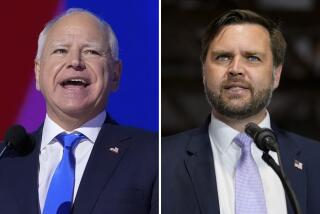Stop Talking About Debates--Let’s Debate : Bush people stalling as White House asks for more time
- Share via
Ever since 1960, when Sen. John F. Kennedy and Vice President Richard M. Nixon set a standard never since quite matched, the candidates’ debate has been a fixture of the quadrennial presidential campaign. Unfortunately, with each successive election, that eminently useful tradition has struggled with a greater load of petty wrangling: how many encounters, where, when, how many reporters, which reporters, lighting, height of lecterns, audience or no audience, applause or no applause, etc. ad nauseam. The real debate was in danger of disappearing beneath the weight of debates about the debate.
With that in mind, the Commission on Presidential Debates took charge starting in 1988. This year, co-chaired by Frank J. Fahrenkopf Jr., former Republican Party chairman, and Paul G. Kirk Jr., former Democratic Party chairman, the commission interviewed former candidates as well as academics and media critics in an attempt to settle on a format that would be fair to both parties while subordinating both to the public interest.
The commission did its work well. Journalists, including those who work for this newspaper, may be chagrined, but the judgment of the commission was that the public would be best served by a format in which the candidates would question each other, assisted only by a moderator. Three presidential debates were proposed: Sept. 22 at Michigan State University, Oct. 4 at the University of San Diego and Oct. 15 at the University of Richmond. A vice presidential debate was scheduled for Sept. 29 in Louisville, Ky.
And then? The Democrats accepted the proposals, but the Republicans have now rejected them. In favor of what? Well, that is to be the subject of a debate: “Our position is that, at some appropriate point, we’ll sit down with the Clinton people and talk about debates,” Bush campaign chairman Robert M. Teeter says.
This is a cowardly, not to say faintly absurd, position. Eight weeks from Election Day is no time to open the debate about the debate. This is just the mess that the commission was organized to avoid. The Bush-Quayle campaign will disgrace itself if it does not agree to all or most of what the commission has proposed. Despite what a take-no-chances campaign chairman like James A. Baker III may think, he is taking a large chance by re-politicizing an honest, bipartisan attempt to raise the debate above politics. Reluctance by the Bush campaign will only hand Clinton and Gore the opportunity to remind the voting public of those issues that they’ll say Bush and Quayle must be afraid to talk about.
Finally, whether or not the debates are scheduled as they should be, we hope that President Bush accepts another invitation that he has so far ducked. Sens. Bob Graham (D-Fla.) and John C. Danforth (R-Mo.) have proposed that each candidate take on that issue of issues, the federal deficit, in an hour of solo, televised discussion with two respected senators who have chosen not to run for reelection: Warren B. Rudman (R-N.H.) and Kent Conrad (D-N.D.). Rudman has served on the Appropriations Committee, Conrad on the Budget Committee. Neither can be snowed by campaign rhetoric, and the public would benefit enormously from watching them in a no-holds-barred tussle with the candidates. Clinton has accepted the invitation. Let’s see the President do likewise.
More to Read
Get the L.A. Times Politics newsletter
Deeply reported insights into legislation, politics and policy from Sacramento, Washington and beyond. In your inbox twice per week.
You may occasionally receive promotional content from the Los Angeles Times.










